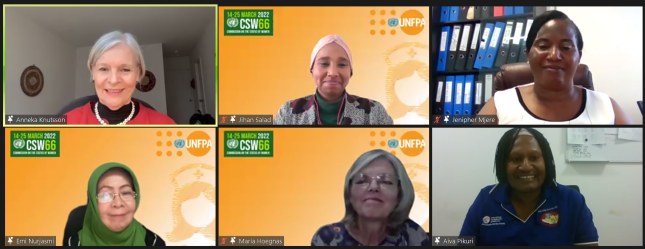-
66th Session of the Commission on the Status of Women: Six Pillars to Support Midwives
April 13, 2022 By Chanel Lee
“When women can decide on the timing and spacing of their births, are treated with respect, and offered quality of care across the life course—they are not only able to survive, they, their families, and their communities are able to thrive and flourish. By directly and indirectly contributing to women’s empowerment, midwives are contributing to strengthen economic and productive and equitable societies,” said Dr. Julitta Onabanjo, Director of the Technical Division at the United Nations Population Fund (UNFPA), New York, at a recent event hosted by UNFPA as part of the 66th Session of the Commission on the Status of Women. Midwives and midwifery experts convened to discuss the important role that midwives play in the improvement of gender equality, women’s economic empowerment, and climate justice.
Dr. Onabanjo introduced a 6-pillar framework to support midwives. The first pillar addresses the critical shortfall of midwives around the world. More needs to be done to elevate and market the midwifery profession and to encourage young people to see midwifery as the noble and worthy profession that it is, said Dr. Onabanjo. In Zambia, where 90 percent of midwives are women, midwives are encouraging other women to take up midwifery as a career, said Jenipher Mjere, Midwife, Sexual and Reproductive Health, and Fistula Analyst at UNFPA, Zambia. The second pillar promotes midwifery leadership in policymaking, which requires strengthening midwifery associations, nurturing young midwifery leaders, and creating leadership posts for midwives in the health sector. “Midwives need to have a say on issues such as adequate financing, safe working environments, reasonable working hours, salary leaves, and access to continued professional development,” said Dr. Onabanjo.
The third pillar improves the quality of midwifery education through access to competency-based teaching, training in clinical settings, and better access to well-qualified and skilled midwifery faculties and institutions. “[Midwives] should actually be able to not only compete at an international level, but have an opportunity to further their qualifications,” said Dr. Yasmin Rashid, Provincial Minister of Punjab Province for Primary and Secondary Health, Specialized Healthcare, and Medical Education in Pakistan. In Bangladesh, government support is contributing to midwifery education and faculty development, including training and mentorship, said Siddika Akter, Director General and Directorate General of Nursing and Midwifery in Bangladesh. Bachelor of Science and Master of Science programs in midwifery are slated to start in 2022 and 2024, respectively, she said.
The fourth pillar supports improved work policies to ensure equitable distribution and retention of qualified midwives. To support working conditions for midwives, we must listen to their voices, said Maria Hoegnas, Midwife and Director of Art Life and Birth in the Democratic Republic of Congo. The fifth pillar centers on creating an enabling environment for midwives by strengthening overall health systems, including making systems resilient and adaptable to climate shocks. Midwives are at the intersection of sexual and reproductive health and climate change action. In natural disasters, midwives are usually included as part of the initial health team deployed to deliver life-saving care including family planning and maternal and newborn health, said Dr. Emi Nurjasmi, President of the Indonesian Midwives Association. Midwives also often work in the most resource-limited settings, said Sister Aiva Pikuri, Senior Midwife and Labour Ward Manager in Papua New Guinea.
Challenges related to communication, physical accessibility, referral pathways, natural disasters, and climate change often affect midwives’ practice, said Pikuri. When midwives are highly trained and supported by infrastructure and equipment, they are best prepared for the effects of climate disasters, said Dr. Onabanjo. In Jordan, climate change is contributing to the most pressing issue facing the country—water scarcity, said Jihan Salad, Sexual and Reproductive Health Specialist at UNFPA, Jordan. “Some hospitals and schools don’t have enough water to maintain sanitation standards, and consequently, the number of people accessing health services in clinics, including sexual/reproductive health services have reduced,” she said.
The sixth pillar to support midwives focuses on the need to strengthen licensing and regulation of the profession to ensure quality of care and the protection of midwives. When midwives are supported, so are the patients they serve. When you invest in midwifery care and leadership, you are strengthening the most vulnerable during one of their most crucial moments in life—birth, said Hoegnas. “This will enable, empower, and fulfill birthing women and girls, as well as [the] midwife.”
Read More Section
- Midwives can meet 90 percent of sexual, reproductive, maternal, newborn, and adolescent health needs.
- Indigenous midwives help their communities connect with their cultural roots and practices.
- Midwives provide essential care to women, families, communities, and the greater society.
Sources: United Nations Population Fund (UNFPA).
Photo Credit: Maternal Health Initiative.
 A Publication of the Stimson Center.
A Publication of the Stimson Center.



